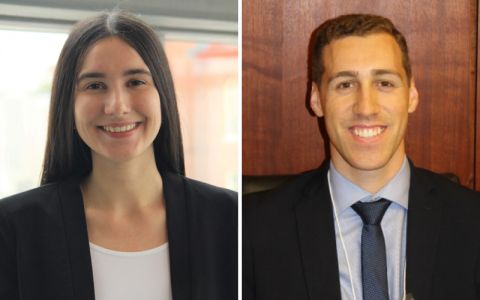
For excelling in their legal ethics and professionalism courses last academic year, Law’19 classmates Jennifer Clay and Ryan Mullins were awarded McCarthy Tétrault scholarships. This year, while Clay is working at a law firm and Mullins is clerking at a court, both are putting that education into action.
Clay is completing her articles at Weaver, Simmons LLP’s Labour and Employment Department in Sudbury, Ontario. The full-service firm serves clients throughout Northern Ontario and boasts the largest team of management-side labour lawyers in the region.
“Since starting my articles, it has been fascinating to see how our legal ethics education applies in real practice,” she says. “When attending various hearings, I see the ethical principles related to speaking to witnesses throughout the proceedings in action. The conflict of interest principles are always top of mind when dealing with new clients. In the labour and employment context, determining who your client is can be particularly important when dealing with institutional clients.”
At Weaver, Simmons, her work includes drafting pleadings, reviewing policies and procedures for compliance with employment legislation, responding to client inquiries about various workplace issues, participating in workplace investigations and drafting workplace investigation reports, preparing witnesses for hearings, researching case law and observing all kinds of hearings with her mentors.
“The legal ethics education provided at Queen’s Law truly prepares grads for these types of situations that arise daily during articling, which require putting legal ethics principles to work,” she says. “In my last year at Queen’s Law, I was humbled to receive the McCarthy Tétrault LLP Scholarship in Legal Ethics and Professionalism. The sponsorship of this award communicates to law students the importance of ethics in the profession.
“We are very lucky at Weaver, Simmons LLP,” she continues. “We have mentors who support students during our learning process and will take the time to discuss and reflect on how to approach ethical issues that arise.”
Mullins, a Judicial Law Clerk at the Superior Court of Justice in Toronto, asserts the underlying importance of legal ethics and professionalism: “It is a lawyer’s duty to perform their role ethically. An ethical lawyer serves their client, their profession, and the greater community.”
During his clerkship so far, he has seen and is learning from, many examples of how ethical issues arise in practice. “For example, I have conducted research on when counsel may withdraw as counsel of record for ‘ethical reasons’ in a family law matter. I then saw the motion to withdraw argued.
“I have also observed, in the in-court conduct of various counsel, differing levels of adherence to the rule that a lawyer must treat opposing counsel with civility,” he adds. “I have seen counsel treat each other with the utmost respect, but I have also seen examples of what could be characterized as disrespectful facial expressions or body language directed at opposing counsel’s submissions to the court. While passions can often run high in legal proceedings, a lawyer must treat others with civility nonetheless, most especially in the public eye of an open courtroom. Such behaviour contributes, through example, toward respect for the administration of justice.”
While conducting his research, Mullins indeed has a front row seat to witness and analyze what he learned about ethics and professionalism at Queen’s Law. He is also making good use of this knowledge for his future career.
“As an aspiring Crown Attorney, and a firm believer in the ethical practice of law, I was honoured to receive the McCarthy Tétrault LLP Scholarship in Legal Ethics and Professionalism,” says Mullins. “I sincerely thank McCarthy Tétrault LLP for their commitment to ethics education at Queen’s Law.”
Funding an annual scholarship for two students is just one part of the McCarthy Tétrault LLP Legal Ethics and Professional Responsibility Program at Queen’s Law. The firm also funds
- an annual lecture presented by leading legal community members – including Federal Court of Appeal Justice David Stratas, Law’84 – who share their professional insights and experiences with students and members of the local bar;
- visits to the Legal Ethics and Professionalism class by prominent Canadian lawyers such as securities litigator Joe Groia who discussed the famous Groia v. Law Society of Upper Canada case for which the Supreme Court of Canada ruled in his favour in 2018;
- a subsidy for each student registered in the mandatory course for the required text: Introduction to Legal Ethics, 2nd Edition (LexisNexis Canada), written by Professor Arthur Cockfield, Law’93, who has extensive teaching experience in legal ethics; and
- a panel of prominent lawyers and judges who discuss challenging issues to all first-year students during Orientation each September.
By Lisa Graham